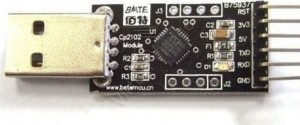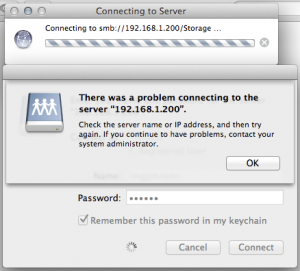Posts Tagged D-Link
CP2102 on DNS-323
In one of my personal projects, I needed to connect and use a USB to RS232 (Serial) converter on my D-Link DNS-323. Weird requirements, I know. Anyway… 😐
Plenty of these converters exist out there, but I choose to go for a CP2102:

Innocently, I first tried to compile the code source of this module which can be found on the following page:
http://www.silabs.com/products/mcu/Pages/USBtoUARTBridgeVCPDrivers.aspx
After a few painful and unsuccessful tries, I decided to look around for the already-compiled module. 😉
While wondering why I didn’t think of that before, I used the instructions below to install the required modules on my NAS:
cd /mnt/HD_a2/ffp/lib/ mkdir modules mkdir modules/2.6.12.6-arm1 cd modules/2.6.12.6-arm1 wget http://dev.skcserver.de/dns323/modules_v1.03/kernel/drivers/usb/serial/usbserial.ko wget http://dev.skcserver.de/dns323/modules_v1.03/kernel/drivers/usb/serial/cp2101.ko chmod 755 usbserial.ko chmod 755 cp2101.ko
Once the modules are installed, the next step is to initialize them.
I wrote the following script for this purpose so you can execute it anytime you need it:
#!/bin/sh insmod /ffp/lib/modules/2.6.12.6-arm1/usbserial.ko insmod /ffp/lib/modules/2.6.12.6-arm1/cp2101.ko mknod /dev/ttyUSB0 c 188 0 chmod 0666 /dev/ttyUSB0
At this point in time, you should have your module initialized on your D-Link DNS-323.
You can check the kernel ring buffer using the dmesg command to verify it loaded properly.
This is a snapshot of what I have in my kernel ring buffer after I ran the script above:
usbcore: registered new driver usbserial drivers/usb/serial/usb-serial.c: USB Serial support registered for Generic usbcore: registered new driver usbserial_generic drivers/usb/serial/usb-serial.c: USB Serial Driver core v2.0 drivers/usb/serial/usb-serial.c: USB Serial support registered for CP2101 CP2101 1-1:1.0: CP2101 converter detected usb 1-1: reset full speed USB device using ehci_platform and address 5 usb 1-1: CP2101 converter now attached to ttyUSB0 usbcore: registered new driver CP2101 drivers/usb/serial/cp2101.c: Silicon Labs CP2101/CP2102 RS232 serial adaptor driver v0.04
Finally, you can test the communication with your USB to RS232 converter by connecting a LED between the RXD and 3V outputs and running the following script:
#!/bin/sh while [ true ] do echo "hello world!!!" > /dev/ttyUSB0 echo "sent" sleep 1 done
If you see the LED blinking, it means you succeed! 😀
Samba access problem with Mac OS X 10.6+
This is a problem I encountered when I upgraded Mac OS X from the version 10.5 (Leopard) to 10.6 (Snow Leopard). One of my friend also got a similar problem when she upgraded to the version 10.7 (Lion).
This issue was affecting the access to the network shares set up with Samba (version 3.0.24) on my D-Link DNS-323. For some reason, I wasn’t able to authenticate on the shares as soon as I upgraded to Snow Leopard!
Here is the error message I was getting:

After browsing a few forums on the web, I finally found a solution. 🙂
I simply had to change the security mode in the Samba configuration file (smb.conf) to read:
security = USER
Note that this property can be found under the [global] section.
For more information about the Samba security mode, please read the following article by Jack Wallen:
Understanding Samba security modes
ntpd process on D-Link DNS-313
During the configuration of a D-Link DNS-313 which is basically a NAS (Network-Attached Storage), I got a serious but easy-to-fix problem. 🙂
In order to get access to the box by command line, I installed the Fonz fun_plug. I then wanted to automatically synchronise the internal time with some NTP Pool Time Servers. But, for some reason, the version of the ntpd process provided with fun_plug is completely freezing the NAS. I wasn’t able to find the root cause of it, trust me, I tried everything I could think of!
Please also note that the same process is working perfectly fine on his brother, the D-Link DNS-323. As I said, I can’t explain why… 🙄
But there is a good news! The ntpd process is actually part of the D-Link DNS-313 firmware. And it is working fine! 😀 After double-checking, this process is however NOT part of the D-Link DNS-323 firmware. Why is that? Maybe D-Link got complaints from DNS-313 users and fixed it? Who knows…
Anyway, in order to get the ntpd process to work on the D-Link DNS-313, you need to replace the content of your ntpd startup script (/ffp/start/ntpd.sh) by the one below:
#!/ffp/bin/sh
# PROVIDE: ntpd
# REQUIRE: SERVERS
# BEFORE: LOGIN
. /ffp/etc/ffp.subr
name="ntpd"
command="/usr/sbin/ntpd"
ntpd_flags="-f /ffp/etc/ntpd.conf"
required_files="/ffp/etc/ntpd.conf"
start_cmd="ntpd_start"
ntpd_start()
{
# remove rtc and daylight cron jobs
crontab -l | grep -vw '/usr/sbin/daylight' | grep -vw '/usr/sbin/rtc' | crontab -
proc_start $command
}
run_rc_command "$1"

